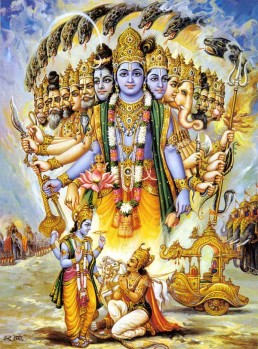Commentary
Great Grandfather: The Creator of even Brahma who is known as the Grandfather.
Swami Chinmayananda
Swami Chinmayananda Commentary
The commentary on this verse and the rest, is avaialble for free as:
Kindle eBook
Google Play Book
Apple Books
Adi Sankara Commentary
You are vayuh, Air; yamah, Death; and agnih, Fire; varunah, the god of the waters; sasankah, the moon; prajapatih, the Lord of the creatures- Kasyapa and others [See note on p.2.- Tr.]; and pra-pitamahah, the Great-grandfather, i. e. the Father ever of Brahma (Hiranyagarbha). Namo, salutations; namah, salutation; astu, be; te, to You; sahasra-krtvah, a thousand times. Punah ca bhuyah api namo te, salutation to You again and again; namah, salutation! The suffix krtvasuc (after sahasra) indicates performance and repetition of the act of salutation a number of times. The words punah ca bhuyah api (again and again) indicate his own dissatisfaction [Dissatisfaction with only a few salutations.] owing to abundance of reverence and devotion. So also,
The Bhagavad Gita with the commentary of Sri Sankaracharya – Translated by Alladi Mahadeva Sastry
Holy Geeta – Commentary by Swami Chinmayananda
The Bhagavad Gita by Eknath Easwaran – Best selling translation of the Bhagavad Gita
The Bhagavad Gita – Translation and Commentary by Swami Sivananda
Bhagavad Gita – Translation and Commentary by Bhaktivedanta Swami Prabupadha
Srimad Bhagavad Gita Chapter 11 – Verse 39 – 11.39 vayuryamo’gnirvarunah – All Bhagavad Gita (Geeta) Verses in Sanskrit, English, Transliteration, Word Meaning, Translation, Audio, Shankara Bhashya, Adi Sankaracharya Commentary and Links to Videos by Swami Chinmayananda and others – 11-39

